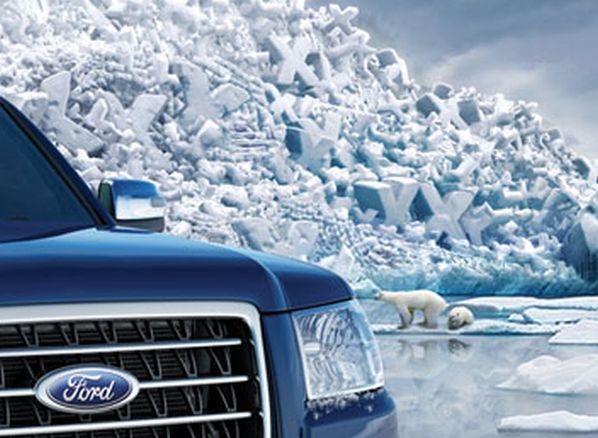Ford to World: "We Promise Global Warming, Melting Glaciers and Dead Polar Bears"


Top: Close-up view of their ad. Click to see complete background of the ad. The image was downloaded from Ford's site and was available here (ZIP file) at the time of posting.
Left: The complete full-page ad from The Hindustan Times, June 25, 2007.
I woke up this morning to find this shocking full-page ad in the newspaper. My first thought: "Could they be any more INSENSITIVE?" What were they thinking by placing a large honking SUV in front of an iceberg that seems to have been destroyed by it? What are they trying to say? That the "beastly power" (their term used in the ad) of the new 4X4 Ford Endeavour is capable of destruction beyond the roads? If so, then that would be spot on.
Or were they trying to laugh at those of us who are concerned about global warming? Are they, by any chance, celebrating the recent decision of US Automobile standards organisation (CAFE) that gave US Automakers 13 more years to improve vehicle efficiency to a level that we should be getting today? I wonder if it was Al Gore that's the butt of their joke whose hit documentary last year showed increasing cases of drowning polar bears as they can't find any ice to latch on to because of global warming caused by automobiles, among other reasons.
Sarcasm apart, it's probably the work of an ignorant graphic designer approved by some equally dim executives at Ford. That said, this is height of ignorance. No topic has attracted as much media coverage worldwide in recent months as climate change. Papers have devoted special supplements, magazine after magazine continues to come out with special "Green" issues and talk show hosts have gone hoarse talking about the topic. Heck, even 5-year old kids know that polar bears are dying because of global warming...
India, which woke up late (around Feb 2007 after the first IPCC report) to the issue of climate change has now witnessed enough media coverage for it to be quite well known. Arvind Mathew, president and MD of Ford India, would have to be living in a cave to not see the connection with the depiction in this ad.
One thing is clear though, this would never have happened in the U.S. If this ad is released there today, Ford would be lynched. Despite their sorry environmental record, all U.S. automakers have been under tremendous public pressure recently to appear green. Ford U.S. has even been running pro-green ad-campaigns, which incidentally, have also featured polar bears but there they are shown as protected and with care "to ensure that the images are anatomically and scientifically correct".
Ford, in U.S. has also been touting its top-10 green credentials, which at #1 includes, not improved efficiency, but, hold-your-breath: seat covers made of recycled fabric!
Thanks to AutoblogGreen for all the coverage of green issues in the U.S. auto industry. I wonder if our friends there (Sebatian, Mike, Sam?) can ask Ford U.S. for a comment.
UPDATE: If you're just as outraged at this as I am, write to Ford and demand an explanation.
UPDATE 2: Am I over blowing it?
Some of you may think I'm fussing over something trivial. Maybe I overstated it in the heat of things, but there are a bunch of things here that pushed me over the edge...
SUVs
- SUVs represent everything that's wrong with the auto industry.
- They are less safe than the regular cars and on top of that they give the illusion of greater safety.
- SUVs are also less fuel efficient than regular cars which themselves are far less efficient to begin with.
- They have far too much space than what's needed or used for city travel.
U.S. Automakers
- The U.S. auto industry is one of the biggest reasons we are in this mess today.
- They've had over 100 years to look for alternatives.
- They've had these alternative technologies for decades.
- They conspired to destroy mass transit in the middle of last century.
- They have a history of suppression of new technology.
- In a more just world, the U.S. automakers would be prosecuted in court. Maybe one day they would be.
Internal Combustion Engine
- It's a disgrace that the predominant mode of personal travel in the 21st century is still the massively inefficient internal combustion engine.
- At just around 20% mechanical engine efficiency, they are the most inefficient modes of transport.
- At less than 1% of well-to-wheel efficiency they waste 99% energy which should be a criminal offense.
- Yet they are sold to public as high-technology, a panacea.
(I can substantiate each of the above statements if anyone wants me to, but I think there's nothing new here. All of this is quite well known. The problem is, we're so surrounded by mediocrity and inefficiency that we learn to ignore it.)
So my contempt for the internal combustion engine, the U.S. automakers and SUVs, together with my concern for global warming combined to lead to an outburst when I saw that ad.
Notes and links
Ford-India microsite for Endeavour 4X4. Find the picture in downloads section.
News coverage of the launch of the new Endeavour
New CAFE standards announced for US automakers
Official website of Al Gore's movie An Inconvenient Truth
Pro-green ad campaigns run by Ford in U.S.
Top-10 Green achievements of Ford
Polar bear trivia: Bush administration, which has long been denying that global warming is dangerous, first conceded it late last year when they called for protection of polar bears. Later, in March 2007 however, Bush barred scientists travelling abroad from talking on polar bears or climate change.

